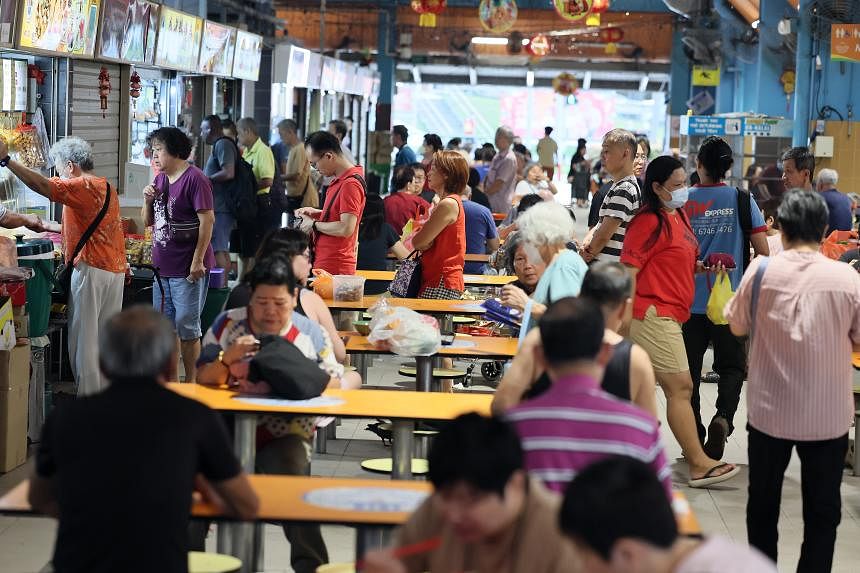SINGAPORE - The mandatory tray return policy at food outlets has catalysed changes in social norms since it was implemented in 2021. But diners can be equipped to go one step further and clean their tables after use, said the researchers behind a public cleanliness survey.
More than 80 per cent of Singapore residents in 2023 indicated they were willing to go the extra mile to clean up spills or wipe down their tables after eating at food outlets like hawker centres or coffee shops because they feel that it is the socially responsible thing to do.
Among those who did not clean up after themselves, 54 per cent of respondents said it was because they did not have the proper equipment to do so.
These findings, released on April 26, were from the Public Cleanliness Satisfaction Survey 2023 conducted by the Singapore Management University (SMU).
The survey, in its sixth edition, also reported that 94 per cent of respondents returned their trays and crockery all the time in 2023.
Satisfaction with cleanliness of food outlets also jumped 2 percentage points to 85 per cent in 2023, compared with 2022.
But cleanliness satisfaction rates at food outlets continued to be the lowest when compared with other domains like transportation, neighbourhoods and commuter paths.
Funded by the Ministry of Sustainability and the Environment (MSE), the study surveyed 2,010 Singapore residents on their perceptions of cleanliness in the Republic from November 2023 to January 2024.
Respondents rated their satisfaction with the cleanliness of 20 public spaces they frequented in their everyday lives, including food outlets like hawker centres or air-conditioned foodcourts, MRT and LRT stations, and places in the neighbourhood like HDB town centres and void decks.
At a media briefing on April 26 to announce the survey results, the co-leads of the study said food outlets could consider piloting the provision of clean tablecloths or tissue paper on dining tables for patrons to wipe down tables after their meals.
“By doing so, Singaporeans will likely be more proactive and gradually feel that they should be more responsible in cleaning up their table litter, thereby instilling this good habit and ensuring cleanliness in public dining places.
“Hopefully, over time, this habit will translate to other public places as well,” said the researchers, led by professor of sociology Paulin Tay Straughan from SMU and Dr Mathew Mathews, principal research fellow at the Institute of Policy Studies.
The survey also highlighted the need for littering to be addressed. Only 72 per cent of the respondents disposed of their litter properly, compared with 76 per cent in 2022.
For those who did not dispose of their trash properly, 47 per cent of them said it was because the trash bin or disposal area was full and there were no other bins nearby.
Ninety-four per cent of respondents – an increase of 3 percentage points from 2022 – also expected that cleaners should clear trash throughout the day, so that bins would not overflow.
But despite an increase in reliance on cleaning services, only 75 per cent of respondents agreed that more money should be spent on cleaning services, which is significantly down from 81 per cent who said the same in 2022.
To reduce the need for more cleaning services and to save on costs, a stronger sense of responsibility for public cleanliness needs to be cultivated in Singapore residents, said the researchers.
This can start with simple behavioural nudges.
“For littering hot spots, a visual aid that instructs individuals on how to properly fold up bulky wastes before disposal could potentially prevent trash bins from overflowing frequently.
“Providing a QR code that links to a feedback form at trash disposal areas could also encourage the public to provide timely feedback on the status of trash bins to cleaning companies,” said the researchers.
Prof Straughan said: “If the whole community could step up to flesh out ideas, we could move a long way. My encouragement to Singaporeans is, don’t wait for the next law to come out. This is our space, and we should take charge of it.”
The study also recorded a substantial decrease in satisfaction levels for cleanliness at public events like the National Day Parade, concerts and sporting events in 2023 – 88 per cent of respondents were satisfied, down from 94 per cent in 2022.
Researchers said the significant drop could be due to a larger scale of public events in 2023, leading to more noticeable littering, compared with 2021 and 2022, when various Covid-19 restrictions were in place.
Dr Mathews said: “Public events draw people from different backgrounds, including those who may be newer to Singapore or just visiting. Not everybody might be familiar with our norms of public cleanliness, especially when our events are international as well.
“What’s important is for those of us who recognise the value of public cleanliness and the norms that have been established here to be able to politely tell other people to clean up after themselves.”
MSE has designated 2024 as the Year of Public Hygiene, with a suite of measures being implemented – from possibly publicising photos of litterbugs to improving the state of public toilets.
Public cleanliness satisfaction rates
Transportation
Roads, bus interchanges, MRT/LRT stations
2023: 98%
2022: 97%
2017: 93%
Leisure
Parks, shopping malls, playgrounds
2023: 97%
2022: 95%
2017: 89%
Food outlets
Coffee shops, hawker centres, wet markets
2023: 85%
2022: 83%
2017: 69%
Neighbourhood
HDB town centres, void decks, lifts to homes
2023: 93%
2022: 91%
2017: 79%
Commuter paths
Walkways, overhead bridges, roadside drains
2023: 95%
2022: 94%
2017: 83%
Public events
After National Day Parade, concerts and sporting events
2023: 88%
2022: 95%


